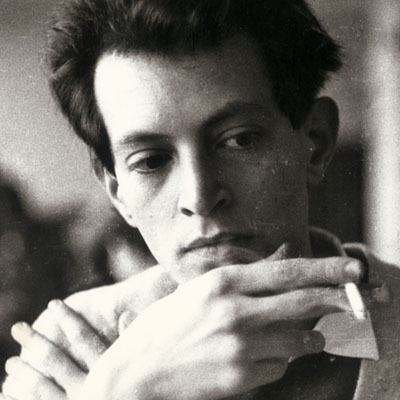Translated from the Turkish by Murat Nemet-Nejat
Rubber
A person’s total weight
in the eye of another
even in death
continues
in his belongings, I
saw your shoes.
I saw a piece of rubber
exploring all the rooms
stretching…
ever as his limb’s thinning into
a limitless shadow
in the next
room.
I only believe in a totally solitary uni-verse…
only that.
the girl’s pointing to a bite on her neck
reflecting her previous lovelife.
that way I’m matching, touching! lovers who have bodies.
a man’s mass volume can be buried onto an alternate world
in his belongings
even if
I lower
pigeons I fell
in love with
in another world…
what if what happ’ns ness is
‘s still
in
another.
—Kauçuk from The Gentlemen of the World
A Knife with a Shaft, a Fragment
forget
what you tried to lighten, scrubbing hard
I stuck a pin
into dawn
to see if it’s here.
do you understand now
that the totality of desire’s wounded
by the coming morning
the needle of the bee
is on your beautiful lip
and the pine needle on your breast
let’s pull down the curtain
and bathe us in drops of darkness
under cool shadows of spring rain…
…
maybe,
if you plant a sword into my sleep, that’s turned to ash,
seeing the blood drops, I will wake.
—Sapli Biçak from The Green Flame
Skinny
This day
I’m showing you
my honey
matured
in your
honeycomb
‘m showing you the eye of an octopus
and and
the whiteness in everything.
I’m slipping into clothes
in bad temper, with desire
with anger
your hand’s
not touching
me
your body’s
not embrac’
ing
me.
Gyrating— the human body
gyrating in the sky—
turning dense…
birds have
skinny bones.
Finally…
seeing the mature honey
in my honeywoun’
nd
seeing the octopus’s eyes
seeing the whiteness o’
everything.
—Cılız from The Green Flame
Orange, a Fragment
…
I was an onion that grew in the mountains,
you happened to pick up.
—Turunculugu Yüzünden from The Green Flame
Beloved
Here there are hundreds of children like me
digging deep into each others’ bodies
killing time.
and at night their sounds are hanging from the ceiling
like live wires.
darkness is approaching groping for things to hold to
barely visible. I’m waking up exactly then
still alive,
barely, to keep the sea live in the body, beloved.
at one time one gazed also at the water. like the moon does,
beloved.
as if darkness is drinking the passing days reaching
from the very deep.
with a rock hanging around her neck the girl’s gazing at the water.
I’m making my possessions of the world touch water
until I can bear no more.
bending, I will hear your voice.
and I will hear all sounds of the world.
suddenly I’m nudged & I’m afraid.
cover yourself my beloved.
this poem depends on the carp’s jump.
take a flight… and go straight,
the sky’s saying.
as if fall’n for you,
the rain also’s asking of you.
I imagined the flying carp
waking up in the morning
by the river, thought of everything.
as running water.
great things are not designed
they connect simply by themselves.
—Sevgilim from The Gentlemen of the World
Pigeon & Child
the pigeon’s legs
appeared wild
in the green grass,
tracing its movements
the boy was oblivious
to his surroundings
to which
the pigeon’s
adding its somersault
the first day
of an endless holiday.
*
the
first day of an endless
holiday
the boy’s adding
his somersault, the pigeon
oblivious
to his
movements
in the
grass,
*
considered one, and together—
in this idyll—
yet one
one
each
in
solitude
tracing the other’s
bubble quantum
somersault jump
(air is
are
here!)
in his
sleep
in its
sleep.
—Güvercin Ve Çocuk from The Gentlemen of the World, page. 42
Translator’s Note
“I am you, when I am I.”
“´Eloge du Lointain,” Paul Celan
A space basically created in the mind, moving toward dissolution, is the heart of Baydar’s poetry. In this dissolution, basically, a movement through loss and suffering toward water, death, and emptiness, the soul marries the totality of nature and the universe. A hymn, a gesture of love toward the other:
love, among metals
the mind captures an object
(seduced
by the object).
Reading Baydar’s poetry, a critical fact to consider is that he was a painter before he was a poet—his university degree was in drawing and painting. His poems progress by the poet assigning mental spaces to his thoughts. Often, the structure of the poems consists of the arrangement of these spaces, and the music and the cadences they create. Language itself—the syntactical clarity of references within a sentence— is secondary, seemingly an afterthought, almost never, except for the puns, the direct focus of the poet. The arrangement of thought in some of his most resonant poems seems on the verge of chaos— due to sudden jumps and a shifting ambiguity in who or what the addressee is, partly achieved by the absence of gender and most other specifying distinctions in Turkish pronouns— a language which seems a mixture of flatness pierced by moments of dazzling clarity. What one has is a space of blurred meanings where what one ‘sees’ are interchanges among different cadences/spaces. The main impetus of Baydar’s poems is to move from the specificity of language to the openness of blurred spaces, the transition from the limitations of words to a place beyond them: in other words, poetry on the peripheries of language.
A limit of isolation and inwardness.
The poems in this selection come from Sami Baydar’s first two books of poetry, Dünya Efendileri (1987) and The Green Flame (1991).
Also, read a Turkish poem by küçük İskender, translated to English by Gonca Özmen & Neil P. Doherty published in The Antonym
Every Poet’s Fate Is Sealed By A Stroke Of Their Pen by küçük İskender



























0 Comments